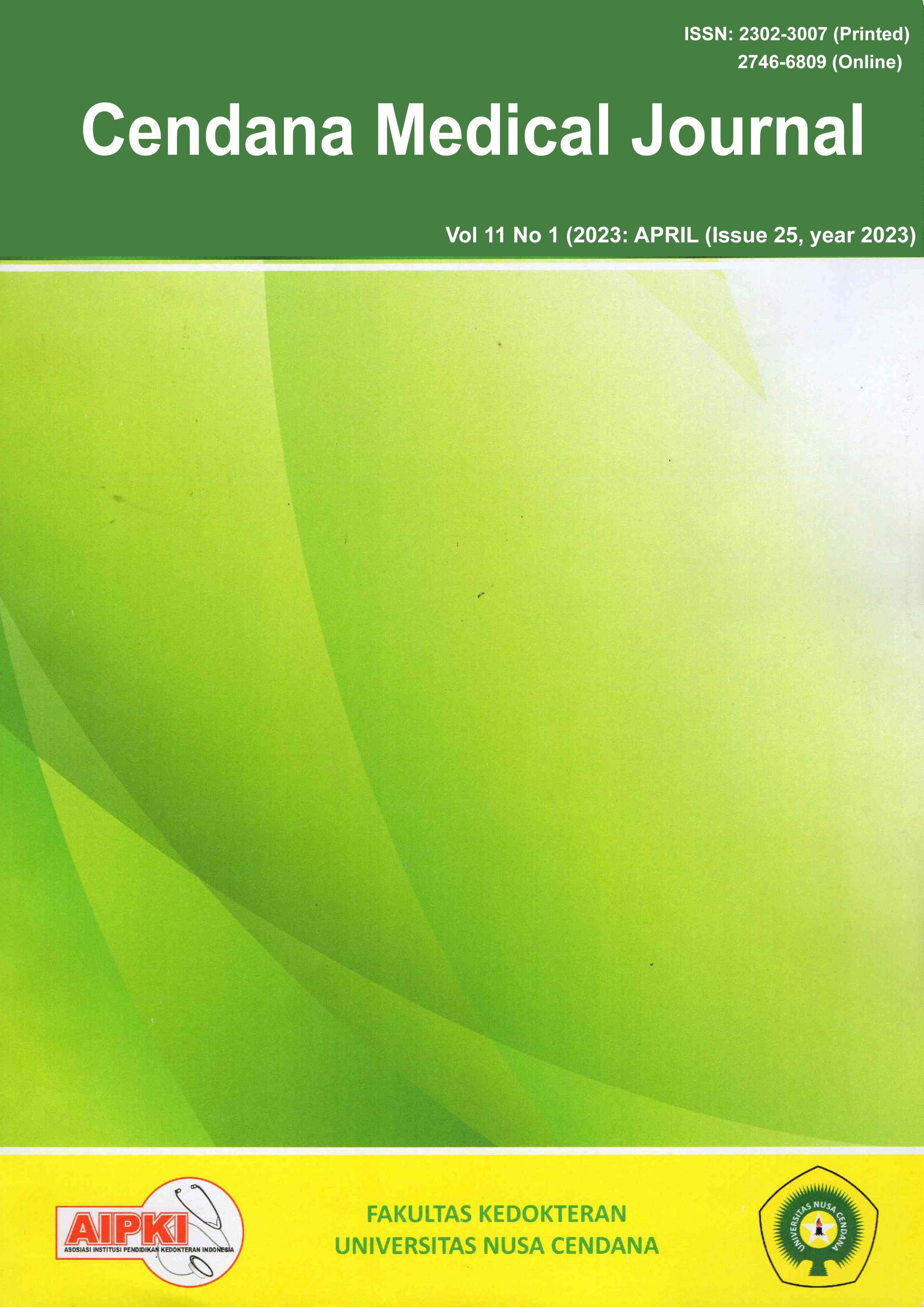Increasing The Incident Rate Of Primary Headache Resulting From Poor Sleep Quality In Nusa Cendana University Faculty Of Medicine Students Year 2020
Abstract
Abstract
Background: According to the World Health Organization (WHO) about 90% of the world’s adult population experience headache at least once a year. Globally, it is estimated that headache prevalence in adults is around 50-75% for the age range of 18-65 years old. One of the risk factors for headache is sleep disturbance. The frequency, intensity, and onset of headaches have a significant association with the incidence of sleep disturbances, including nightmares, difficulty falling asleep, waking up too early, and poor sleep quality. These sleep disturbances are caused by changes in neurotransmitters such as serotonin and melatonin that disrupt the circadian rhythm. The Medical Faculty student group is relatively prone to having poor sleep quality. This can be caused by the high duration and intensity of learning, doing tasks that require extra energy and concentration.
Objective: To determine the relationship between sleep quality and the incidence of primary headache in students of the Faculty of Medicine, the University of Nusa Cendana in 2020.
Methods: This study was an observational analytic study that employed a cross-sectional design conducted on preclinical students of the Faculty of Medicine, the University of Nusa Cendana using the Pittsburgh Sleep Quality Index (PSQI) questionnaire and the primary headache questionnaire. The sampling technique used stratified random sampling with a total of 74 respondents who met the inclusion and exclusion criteria. The study was analyzed by univariate, bivariate using the chi-square test.
Results: From 74 respondents, it was found that 54 respondents (73%) had poor sleep quality and 20 respondents (27%) had good sleep quality. From 74 respondents, 51 respondents (68.9%) also had a primary headache and 23 respondents (31.1%) did not have a primary headache. The results of the bivariate analysis test in this study obtained p = 0.007 (p <0.05) and the RR (Relatif Risk) value for poor sleep quality on headache is 2.475 or 2 times (RR> 1) which means that the variable studied is a risk factor.
Conclusion: There is a significant relationship between sleep quality and the incidence of primary headaches in students of the Faculty of Medicine, the University of Nusa Cendana in 2020.
Keywords: sleep quality1, primary headache2, medical students3
Downloads
References
Habel et. al., Hubungan kualitas tidur dengan nyeri kepala primer pada masyarakat daerah pesisir desa nusalaut, Ambon SMART MEDICAL JOURNAL (2018) Vol. 1 No. 2. eISSN : 2621-0916
Headache Classification Committee of the International Headache Society (IHS), 2013. The International Classification of Headache Disorders, 3rd edition (beta version), 643.
World Health Organization. Sleep and cephalgia WHO; WHO: 2012.
Iliopoulos, P., Damigos, D., Kerezoudi, E., Limpitaki, G., Xifaras, M., Skiada, D., Tsagkovits, A., Skapinakis, P., 2015. Trigger Factors in Primary Headaches subtypes : a cross-sectional study from a tertiary centre in Greece. BMC Research Notes, 8(393), pp.1-10
Lyngberg AC, Rasmussen BK, Jorgensen T, Jensen R: Has the prevalence of migraine and tension-type headache changed over a 12-year period A Danish population survey. Eur J Epidemiol 2015;20:243–9
Azad MC, Fraser K, Rumana N, Abdullah AF, Shahana N, Hanly PJ, et al. Sleep disturbances among medical students: a global perspective. J Clin Sleep Med. 2015;11(1):69–74.
Mawo P. Hubungan Kualitas Tidur dengan Kadar Hemoglobin Mahasiswa Fakultas Kedokteran UNDANA. Universitas Nusa Cendana; 2018.
Akbar, A. 2017 Faktor Pencetus Timbulnya Nyeri Kepala Primer pada Mahasiswa Tingkat Akhir Program Studi Pendidikan Dokter Fakultas Kedokteran Universitas Hasanuddin, Skripsi
Simanjuntak, M. 2017 Hubungan antara kualitas tidur dengan intensitas dan frekuensi nyeri kepala pada mahasiswa Fakultas Kedokteran Universitas Sumatera Utara : Repositori Institusi USU
Silvanasari IA. Faktor-Faktor Yang Berhubungan Dengan Kualitas Tidur Yang Buruk Pada Lansia Di Desa Wonojati Kecamatan Jengawah Kabupaten Jember. Universitas Jember; 2012.
Viona. Hubungan antara Karakteristik Mahasiswa dengan Kualitas Tidur pada Mahasiswa Program Studi Pendidikan Dokter Fakultas Kedokteran Universitas Tanjungpura. Universitas Tanjungpura; 2013.
Luthfi, Mohd dkk. 2017. Hubungan Kualitas Tidur dengan Tekanan Darah pada Pelajar Kelas 2 SMA Negeri 10 Padang. Jurnal Kesehatan Andalas.2017;6(2)
Rori, Andre dkk.2016. Gambaran nyeri kepala pada mahasiswa pemain game komputer di Fakultas Kedokteran Universitas Sam Ratulangi angkatan 2012. Jurnal e-Clinic (eCl); 4(1).
Yasmin, A.2017. Hubungan antara angka kejadian nyeri kepala primer (migren/Tension type headache)dengan gangguan tidur insomnia pada siswa-siswi SMA Negeri 17 Makassar [Skripsi].Fakultas Kedokteran Universitas Hassanudin.
Larsson, B., Fichtel, A. 2014. Headache prevalence and characteristics among adolescents in the general population: a comparison between retrospect questionnaire and prospective paper diary data. The Journal of Headache and Pain;15(8).
Talebian, A. et al. 2015. Causes and associated of headaches among 5 to 1-yearold children referred to a neurology clinic in Kashan, Iran. Iran J Child Neurol;9(1):71-75.
Aladita N.2017.Hubungan antara Kualitas Tidur dengan Nyeri Kepala Primer (NKP) pada Mahasiswa angkatan 2014-2016 Fakultas Kedokteran Universitas Hasanuddin.
Copyright (c) 2023 Cendana Medical Journal

This work is licensed under a Creative Commons Attribution-NonCommercial-NoDerivatives 4.0 International License.
Copyright Notice

This work is licensed under a Creative Commons Attribution 4.0 International License.

 Destrini Anjani Landa(1*)
Destrini Anjani Landa(1*)












